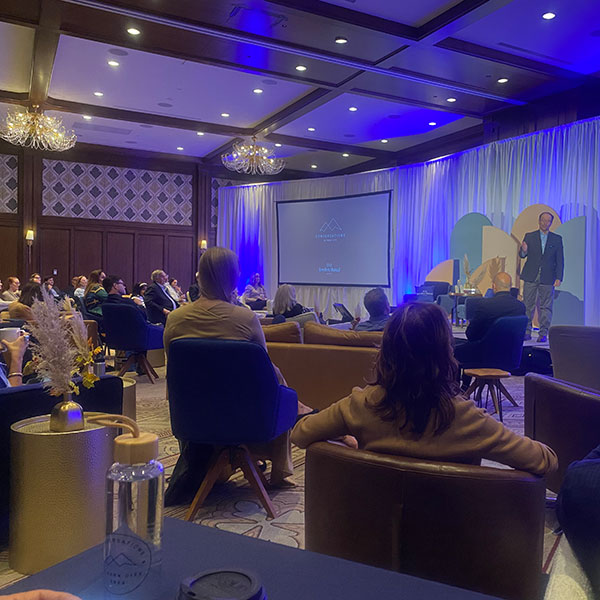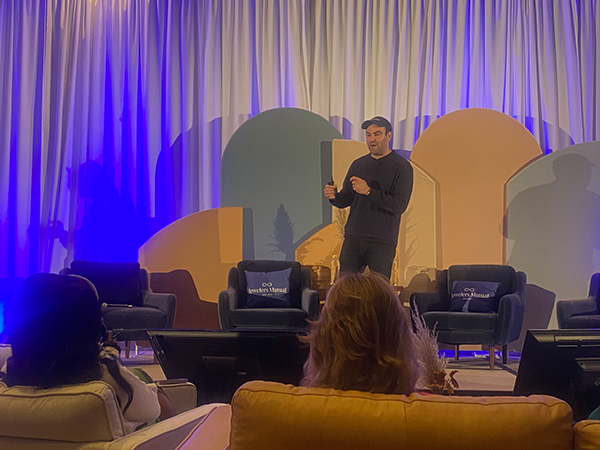
At Conversations in Park City—an Oct. 13–15 event billed as a jewelry industry thought leader retreat—participants were advised to explore artificial intelligence, reexamine their supply chain and return processes, and expand what is considered luxury or collectible in an effort to better serve customers.
Whereas last year’s inaugural Conversations in Park City touched on NFTs, blockchain, and bitcoin, this year’s speakers mentioned those tech tools only briefly, given their cooler reception of late. Instead, the 2023 event focused on how jewelers could improve customer experience, marketing messages, and loyalty in a luxury world where they must compete for people’s attention, time, and money.
Sponsored by Jewelers Mutual, the seminar and networking event for jewelry executives, retailers, and designers was held at the St. Regis Deer Valley resort in Park City, Utah. Organizers said that more than half the invited participants at this second iteration were new and included established, emerging, and diverse players in the retail, manufacturing, and creative sectors.

Here is an overview of some topics and conversations from the Park City gathering:
• Jewelers Mutual executives emphasized the event was organized not only to improve the insurance company’s business but also to help the jewelry industry learn to be resilient through economic ups and downs and, over the long term, to be more profitable. “We’re only as strong as the industry is,” Scott Murphy, Jewelers Mutual president and CEO, said to the crowd. Mark Smelzer, vice president of content for Jewelers Mutual and creator of Conversations in Park City, led conference participants in a moment of silence to reflect on Israel, the world’s geopolitical challenges, and hope for the future.
• Futurist and trends consultant Jeff Weiner encouraged attendees not to be reluctant about artificial intelligence programs, like ChatGPT. He said curiosity about such technology would take the jewelry industry further, and people should see it as democratizing rather than intimidating. Weiner recommended that jewelry businesses try out new tech, as it is becoming more accepted in other industries. “This stuff is here to stay, and it’s moving quite quickly,” Weiner said. “Play with it, have fun, get started. Don’t let it get stuck in committee.”
• Andy Ruben, founder and executive chairman of Trove—a California-based company that offers branded resale options for retailers and helps them establish buy-back, exchange, recycling, and loyalty programs—urged jewelers to think about customer relationships at all points of the purchase and returns cycle, noting that resale programs can generate revenue and build connection and community. “The sale is the start of the relationship,” Ruben said. “[Resale] is an invitation to stay connected to the brand.”
• Randi Molofsky, owner of independent brand development agency For Future Reference, and jewelry designer Lauren Harwell Godfrey, talked about their 20-plus-year relationship and how they grew Harwell Godfrey from a dream into a successful business. Godfrey said she invests heavily in developing brand visuals, using triangles, large gemstones, and unique gemstone layout within her design to make sure people recognize her work immediately. Molofsky spoke about applying for grants and awards to boost industry credibility and courting media through exceptional pieces, like Godfrey’s crab pendant that raised public awareness of her brand.
• Brahm Wachter, head of streetwear and modern collectibles at Sotheby’s, wowed the audience during his Oct. 15 keynote describing how he helped the venerable auction house build a younger customer base and a reputation for unique partnerships in sportswear and sports memorabilia. There was an audible gasp in the room when Wachter told how he drummed up excitement (and profits) for Sotheby’s sales such as the $5.8 million Kobe Bryant jersey.
“Beauty and importance is in the eye of the beholder,” Wachter said, explaining that athletic shoes may not last as long as jewelry but are just as meaningful to those who wear, collect, and trade them. He recommended jewelers embrace change among consumers, in tech, and in what younger generations value, as a way to ensure their business stays relevant. “People purchase the cultural assets that are important to them,” Wachter said.
Top: Jewelers Mutual hosted Conversations in Park City from Oct. 13 to 15 to give jewelry industry members actionable advice from thought leaders about tech, marketing, and more. (Photos courtesy of Karen Dybis)
Follow me on Instagram and Twitter
- Subscribe to the JCK News Daily
- Subscribe to the JCK Special Report
- Follow JCK on Instagram: @jckmagazine
- Follow JCK on X: @jckmagazine
- Follow JCK on Facebook: @jckmagazine






